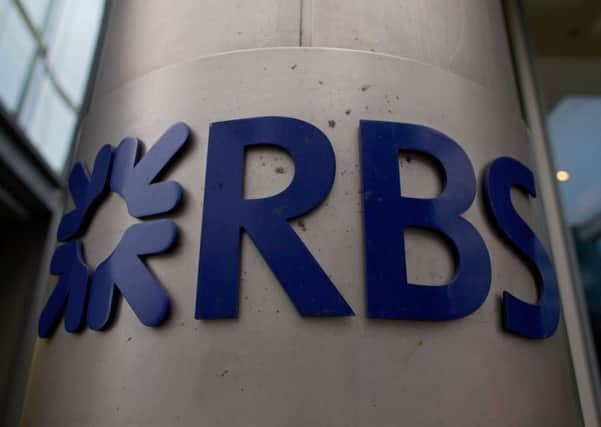RBS pays out £61m to US for breaking sanction


The bank has entered into agreements with the US Federal Reserve, the US Treasury Department and the New York State Department of Financial Services which will see it pay the amount to settle the sanctions-busting allegations with American authorities.
The US Justice Department and the District Attorney of New York have closed their separate investigations and will not bring criminal charges against RBS.
Advertisement
Hide AdAdvertisement
Hide AdThe allegations centre on the transfer of about £21m in funds linked to countries including Burma, Cuba, Iran and Sudan between 2005 and 2009, in contravention of economic sanctions imposed on those nations.
RBS staff are said to have “acted to conceal the identity of sanctioned clients by various means”, including stripping out data from payment messages, according to a statement by the New York state Department of Financial Services.
The latest banking scandal came as Lloyds Banking Group was yesterday handed a record £28m fine by the Financial Conduct Authority for rewarding staff with “champagne bonuses”, even when products they sold consumers were deemed unsuitable.
RBS said in a statement last night that it “acknowledges and deeply regrets these failings”. It also said it has committed almost £300m since 2010 to improve its sanctions controls.
The Edinburgh-based bank, which is 81 per cent owned by the taxpayer, has sacked four employees, including its head of global banking services for Asia, the Middle East and Africa, and its head of money laundering prevention unit for corporate markets since a probe was launched in 2010. Other staff were
subject to misconduct investigations but they remain with the group.
RBS chairman Sir Philip Hampton, speaking to The Scotsman in Edinburgh last night, said: “These things are on a slow burn. We often say these are legacy issues but this really is a legacy issue. Although $100m [£61m] is a lot of money, we are not nearly as culpable as other banks.”
RBS said it had doubled its Anti-Money Laundering and Sanctions Compliance team since June 2011 to a total of 1,700 employees today.
Advertisement
Hide AdAdvertisement
Hide AdThe settlement with the US authorities is the latest setback for RBS. Last week the European Union fined the bank £324m over its collusion to fix yen Libor and Euribor rates, linked to the UK Libor-rigging scandal, in which attempts were made to manipulate interest rates within the inter-bank lending system.
This was done by some traders to boost their own trading desks’ profits, and in other cases by the banks themselves to make them look stronger compared to other banks.
RBS had already paid £390m in fines to the US and UK regulators in February over the scandal.
There have also been a string of IT failures which have prevented customers from accessing their cash, and serious allegations about the way the bank has dealt with struggling business customers. On Tuesday, RBS was hit by the surprise announcement of the departure of finance director Nathan Bostock, who is moving to be deputy chief executive of Santander UK.
Lord Myners, former Financial Services Secretary at the Treasury under the Brown government, said that the deception over dealings with sanctioned countries such as Iran appeared “very wilful and intentional”.
He said: “It’s tragically disappointing that this comes after . . . very similar charges against HSBC in respect of Mexico and Standard Chartered in respect of breaching sanctions and money laundering. It’s embarrassing, to put it at its mildest, that the UK seems to be at the heart of so many of these failures.
“It’s not good that these problems arise in the UK and, reading this RBS statement, it sounds very wilful and intentional – the stripping of names of payment instructions so there were no references to Iran or Cuba.
“One shrugs one’s shoulders and says, ‘What was going on in these banks? How was this allowed to happen’?.”
Advertisement
Hide AdAdvertisement
Hide AdHe added that the pay-out does not conclude RBS’s dealing with the US authorities.
Lord Myners said: “Well, there are more fines to come. This is actually quite a narrow issue; this isn’t closure for RBS with the US regulators; this isn’t the end of the story, a full and final settlement.”
Several UK banks have entered into settlements in recent years over continuing financial transactions with Iran, despite US laws against them, and for removing information from payments to get them processed in the US.
Lloyds TSB Bank Plc became the first bank to settle, forfeiting £230m in 2009. Others to pay penalties include Credit Suisse, Barclays, Standard Chartered and ABN Amro, now part of RBS.
Barclays in 2010 paid £190m to the US authorities for “knowingly and wilfully” violating international sanctions by handling hundreds of millions of dollars in clandestine transactions with banks in Cuba, Iran, Libya, Sudan and Burma.
A spokesman for RBS said: “RBS plc has co-operated fully with the US authorities and acknowledges and deeply regrets these failings.”
Goodwin ‘may have faced charges under planned law’
DISGRACED former Royal Bank of Scotland chief executive Fred Goodwin may have been prosecuted under plans to reform the banking system, Treasury minister Sajid Javid said yesterday.
Mr Javid said it was “quite possible” that had a new criminal offence for reckless misconduct in relation to the management of a bank been in place when Mr Goodwin was still at the helm of the bank, proceedings would have been taken against him.
Advertisement
Hide AdAdvertisement
Hide AdSpeaking in the Commons yesterday, Labour’s Emily Thornberry asked: “With hindsight, could you help the House: would Fred Goodwin have been prosecuted under this clause?”
Mr Javid replied: “It’s quite possible. But it’s difficult to answer that question very specifically.”
Setting out plans to reform the banking system, Mr Javid said: “In future, those who bring down their bank by making thoroughly unreasonable decisions, can be held accountable for their actions; actions, which we have seen, can lead to severe economic disruption and losses for taxpayers.”